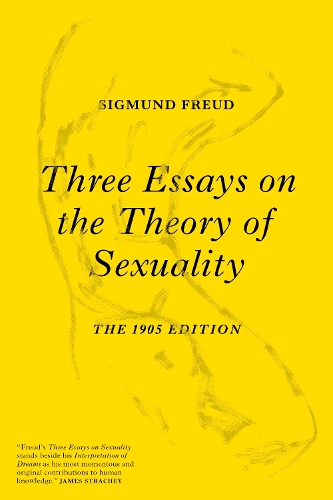
Three Essays on the Theory of Sexuality: The 1905 Edition
(Paperback)
Publishing Details
Three Essays on the Theory of Sexuality: The 1905 Edition
By (Author) Sigmund Freud
Introduction by Philippe Van Haute
Introduction by Herman Westerink
Translated by Ulrike Kistner
Verso Books
Verso Books
3rd November 2016
United Kingdom
Classifications
General
Non Fiction
Psychology: sexual behaviour
306.701
Physical Properties
Paperback
208
Width 140mm, Height 210mm, Spine 14mm
264g
Description
Available for the first time in English, the 1905 edition of Three Essays on the Theory of Sexuality presents Sigmund Freud's thought in a form new to all but a few ardent students of his work.
This is a Freud absent the Oedipal complex, which came to dominate his ideas and subsequent editions of these essays. In its stead is an autoerotic theory of sexual development, a sexuality transcending binary categorization. This is psychoanalysis freed from ideas that have often brought it into conflict with the ethical and political convictions of modern readers, practitioners, and theorists.
The non-Oedipal psychoanalysis Freud outlined in 1905 possesses an emancipatory potential for the contemporary world that promises to revitalize Freudian thought. The development of self is no longer rooted in the assumption of a sexual identity; instead the imposition of sexual categories on the infant mind becomes a source of neurosis and itself a problem to overcome.
The new edition of Three Essays presents us with the fascinating possibility that Freud suppressed his first and best thoughts on this topic, and that only today can they be recognized and understood at a time when societies have begun the serious work of reconceptualizing sexual identities.
Reviews
Freud's Three Essays on Sexuality stands, there can be no doubt, beside his Interpretation of Dreams as his most momentous and original contributions to human knowledge. -- James Strachey
One of Freud's most significant and most original contributions to our understanding of human experience. -- John Russon
Is psychoanalysis outdated . We should not be too hasty. Perhaps we should instead insist that the time of psychoanalysis has only just arrived. -- Slavoj Zizek
The questions posed by Freud were ones that his age did not think of asking-or, if they were asked, the age did not want to hear anything about them. In other words, Freud made history rather than being made by it. -- Octave Mannoni
Freud's work was a new foundation, a rupture. -- Alain Badiou
Author Bio
Sigmund Freud (1856-1939) is one ofthe twentieth century's greatest minds and the founder of the psychoanalyticschool of psychology. His many works include The Ego and the Id; AnOutline of Psycho-Analysis; Inhibitions;Symptoms and Anxiety; and Civilizationand Its Discontents.
Philippe Van Haute is currently professor ofphilosophical anthropology and a practicing psychoanalyst of the Belgian Schoolof Psychoanalysis of which he was president from 2006-2009. He has been afellow of the Stellenbosch Institute for Advanced Study since 2010.
Herman Westerink is Lecturer at the Radboud University Nijmegen.He holds a PhD in theology from the University of Groningen.
